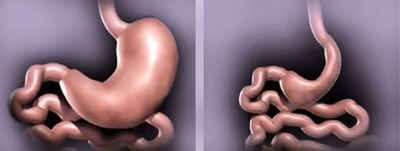Increasingly, sleeve gastrectomies have become the most commonly performed bariatric procedure, both here at the offices Michael Feiz, M.D., F.A.C.S. and elsewhere. Yet, few people understand what it is or how it differs from such older procedures as the gastric bypass.
A gastric bypass works by creating a much smaller stomach and also bypassing a significant portion of the intestines, so that fewer calories and nutrients are absorbed by the digestive system. A sleeve gastrectomy, however, is a less radical alternative where approximately 75%-85% of the stomach is removed, but no other major changes are made in the body. Over time this procedure has proven to have a number of benefits that have set it apart from other procedures. These include:
Reliability – the large majority of patients experience very positive results after a single procedure;
Hormonal benefits and highly effective appetite reduction;
Leaves the digestive system essentially unchanged for better nutrition;
Reduced chance of side effects, including dumping syndrome.
A gastric sleeve surgery facilitates weight loss in two important ways. First, as with other procedures, the small stomach area makes it uncomfortable for patients to overeat. Secondly, and perhaps more importantly, removing most of the stomach also removes an area known as the fundus, which is associated with a hormone called ghrelin.

This hormone is closely associated with the appetite and it appears to be more present in obese individuals; moreover, the body tends to produce more of it as we lose weight, which appears to make it a primary culprit for the great difficulty most people have losing weight and keeping it off over the long-term. The result is that, while patients still have to do a great deal of work to alter their relationship with food, the nagging cravings that usually prevent long-term weight loss are greatly reduced.
At the same time, since the procedure leaves most of the digestive system intact, many of the most common problems associated with the gastric bypass are not an issue. Importantly, the body is able to digest food normally so that, while additional supplementation may still be needed in some cases, the body will be able to receive much of its nourishment in the usual way. It also means that the patient will be able to eat most of the same foods he or she ate before the procedure, although obviously in much smaller portions. This makes issues like dumping syndrome, a problem that is as unpleasant as it sounds, much less likely.
To find out more, please call us at the telephone number above. You can also send us an e-mail by visiting our contact page.